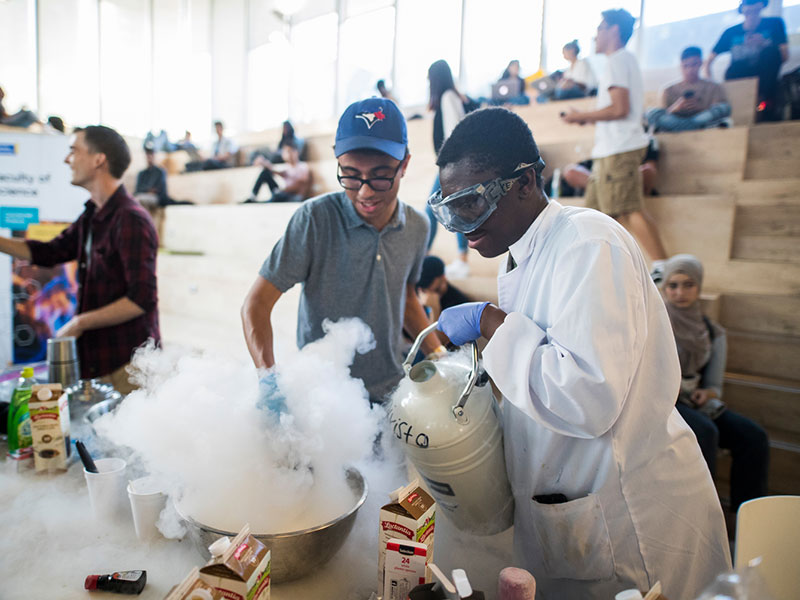The Student Experience and Recommendations

- Letter from President Dr. Mohamed Lachemi
- Foreword from Vice-President, Equity and Community Inclusion Dr. Denise O’Neil Green
- Executive Summary
- Interview Methodology
- The Student Experience and Recommendations
- Staff and Recommendations
- Faculty and Recommendations
- Office of the Vice-President, Equity and Community Inclusion
- Conclusion

Black students at TMU interviewed for this report articulated a set of complex and complicated responses to their experiences of anti-Black racism on campus. The range of issues include: not having a sense of belonging; gaps in curriculum; safety on campus; lack of faculty representation; mentorship; and problems with front-facing services for students.
It is important to note that Black students made clear that they chose TMU for two primary reasons:
1. The unique nature of the programs, and;
2. Their understanding that TMU was, and is, a diverse school and thus a diverse campus.
In both instances students experienced disappointment. This disappointment was articulated across disciplines and programs and went beyond the classroom.

One issue of concern for Black students is that while the TMU community appeared diverse, their specific programs often did not reflect this. For example, a student in a professional program counted about eight Black students across the years of the program. This same student also pointed out that the requirements to enter the program, especially the portfolio stage were vague, with little information and guidance given. This was viewed as an exclusionary practice by this student, who only entered the program after two attempts due to coincidentally having met someone familiar with the program who helped prepare this student’s second application to the program.
Black students interviewed also articulated a view of the curriculum as the “white experience.” Many reported that to find scholarships for their programs and in the areas of their academic interests—in and on Black life—the only place available was Caribbean studies. Some students expressed a need for Black scholarships and Black Studies to exist across the university. They were also concerned that very few professors were Black, with a number of students interviewed admitting that in multiple years of their programs they had not been taught by any Black professors and that they understood this as an impoverishment of the educational content in the program. Indeed, students expressed a longing to be taught by more Black professors across disciplines and programs, very clearly noting a need for more diverse faculty.

Further, many students reported hostility from their white professors. Students discussed preferential treatment given to others and not to them, occurring in blatant fashion. They also reported curriculum materials that denigrated Black people while some experienced the classroom as a place of hostility from both their professors and classmates. Students reported being reprimanded by professors and teaching assistants for speaking up and bringing the Black experience into classroom discussions. They reported that when they raised issues related to the curriculum that often their professors and teaching assistants could not adequately explain the curriculum choices and decisions or account for the exclusion of Black contributions, examples and scholarships from their courses. The experience of having to challenge their professors and teaching assistants left Black students feeling demoralized.
One student from a more traditional discipline expressed disappointment in only being taught the traditional canon, known as the classic works of literature. This student had chosen to leave another university for TMU because of its diversity, eventually defining the TMU experience as, “same deal, different school.” The sentiment of this student was repeated and affirmed by others. Another student in journalism explained this situation by stating that their classmates are “not my people,” having identified only three other Black female students in the program and no Black professors. Nonetheless, the student valued the program to a certain degree and was resigned to making “the best of a bad situation.” Students expressed these sentiments in business, history, engineering, nursing, social work and a range of other disciplines and programs. One student reported being pinpointed by a professor who said “my kind struggle most in the program.” The student felt that such a comment already positioned them as a potential failure in the program and that these kinds of attitudes make life difficult for Black students.
Students also pointed out that current faculty often struggle with teaching materials related to Black people when they attempt to incorporate it. They also reported that current faculty appeared and articulated a fear of teaching about issues related to Blackness and race. The paradox of the situation left students feeling stranded in their programs and stunted in their scholarly pursuits.
Clearly the problem of anti-Black racism is systemic, and students experience it intuitively, in terms of the history of experiences they bring with them and as scholars seeking to deepen their knowledge in various programs and fields. During the focus groups, Black students expressed a sense of resignation to achieving their degree surrounded by anti-Black racism. It is not ideal, but it is what they are willing and forced to live with to achieve the degree. On the experience of being Black at TMU, one student said, “I feel I would be more offended if I was not used to it.”
Reporting Incidents of Anti-Black Racism

Related to the classroom and curriculum issues, students articulated a need for “accountability at TMU,” as one participant expressed. Black students reported going to front-facing offices like Student Affairs, Student Life, Human Rights and Counselling Services to address issues ranging from mistreatment in class and funding issues to classmate hostility and being sent from office to office with no resolution in sight. In describing the experience, students were clear that they felt no one was willing to be accountable to them especially when they had complaints about being violated. Students came to believe that the practice of being “shuttled around” was a deliberate action to frustrate their attempts to seek remedies for their complaints. This experience was particularly upsetting and frustrating for students interviewed and many resigned themselves to an understanding that to achieve their degrees they would simply have to endure being treated differently from everyone else on campus, acknowledging they have little power to impact the experiences they are having at TMU. Issues of security and safety were particularly felt in this way.
Safety
Campus safety and security is extremely complex and requires a delicate balance between ensuring the safety and security of members of the community and actions of those charged with the enforcement of safety and security rules and regulations. These challenges are shared in common across all universities in Canada and in society in general. The history of carding and racial profiling in our society and on campuses speak volumes about the experiences, particularly of young Black men who come into contact with law enforcement officers. These challenges however take very specific forms at TMU because of the university’s physical location in and interconnectedness with the heart of the city of Toronto.
At TMU, the Black students who attended the focus groups reported that they experience and witness security as an intimidating force. They spoke to us about the disparities of campus “policing” for Black students and white students. They were, and are, concerned about campus security working in groups, though it should be noted that campus security staff are expected to work in pairs both for their own safety and for the safety of the community. Students told us that Black students are “policed” differently and often campus security staff linger in the corridors at events they frequent or just outside the building where such events are held.
Students found such practices intimidating and unsafe for them. Students report being followed on campus, asked for ID, and experiencing the condition of always assumed as not belonging. The experience has left students confused and sad about TMU’s claims of diversity. Students report being targeted at library closing hours to quickly pack up and leave while they witness their white peers lingering and never being rushed. Students report similar experiences in sporting venues on campus as well. One example that stands out was recounted by a student who described being followed by a group of campus security who requested this student’s ID and questioned the student about being on campus. When the student attempted to get the information from one of the campus security officers, things escalated and the other security officers blocked the view of the student so the name badge could not be seen. This incident coupled with a hostile living environment deeply impacted this student’s sense of TMU as an unsafe place. The incident was dealt with and diversity and sensitivity training sessions have been implemented.
Similar stories and concerns about campus security were repeated throughout interviews, with Black students making it clear that campus security does not make them feel safe but rather the opposite. Black students feel profoundly subject to racial profiling and this has produced a strong sense of non-belonging to the TMU community. Students point out that complaints procedures are very lengthy and act as a deterrent for filing complaints and seeing them through the process. Black students are especially keen to see campus security reforms that would centre their concerns and shift the tenor from one that assumes Black people are not a part of the TMU community to one in which Black people are assumed to automatically belong.
It should be noted that those charged with ensuring the safety and security of the TMU campus on a day to day, hour by hour basis come from varied backgrounds and 59% self-identify as coming from racialized minority backgrounds. Theirs is not an easy job as they too face taunts, intimidation and the threat of violence, and racialized security staff face racial taunts, intimidation and racialized physical and psychological violence.
This being said there is a need for an open and honest and constructive dialogue involving all campus safety and security staff and Black students, faculty and staff.
Student Recommendations
- A concerted and deliberate effort to diversify disciplines and programs should be undertaken. This would include curriculum, internships, placements and other program practices that impact student success.
- Campus-wide training in equity, diversity and inclusion across all disciplines and programs that is sustained and reinforced by leadership.
- Black faculty representation needs to be addressed in programs, departments, schools and faculties.
- Campus safety and security needs to be prioritized to positively impact Black student belonging, with security to be trained in equity, diversity and inclusion.
- Funding of events, meetings and information sessions that specifically support and centre Black students should be created and/or enhanced.
- A dedicated Black student space on campus with the necessary resources allocated to it for Black students to feel safe and a sense of belonging is needed. These resources should involve funds for staffing and programming for Black students.
